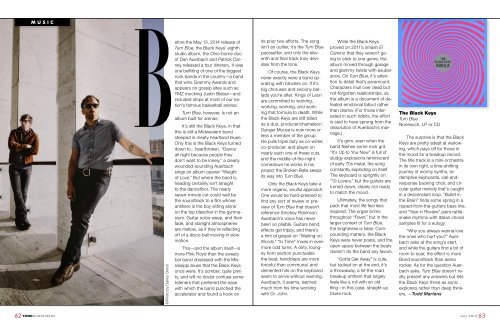You also want an ePaper? Increase the reach of your titles
YUMPU automatically turns print PDFs into web optimized ePapers that Google loves.
MUSIC<br />
B<br />
©Photo by Danny Clinch<br />
efore the May 13, 2014 release of<br />
Turn Blue, the Black Keys’ eighth<br />
studio album, the Ohio-borne duo<br />
of Dan Auerbach and Patrick Carney<br />
released a tour itinerary. It was<br />
one befitting of one of the biggest<br />
rock bands in the country—a band<br />
that wins Grammy Awards and<br />
appears on gossip sites such as<br />
TMZ mocking Justin Bieber—and<br />
included stops at most of our nation’s<br />
famous basketball arenas.<br />
Turn Blue, however, is not an<br />
album built for arenas.<br />
It’s still the Black Keys, in that<br />
this is still a Midwestern band<br />
steeped in meaty heartland blues.<br />
Only this is the Black Keys turned<br />
down to…heartbroken. “Dance<br />
all night because people they<br />
don’t want to be lonely,” a clearly<br />
wounded-sounding Auerbach<br />
sings on album opener “Weight<br />
of Love.” But where the band is<br />
heading certainly isn’t straight<br />
to the dancefloor. The nearly<br />
seven-minute cut could well be<br />
the soundtrack to a film whose<br />
antihero is the boy sitting alone<br />
on the top bleacher in the gymnasium.<br />
Guitar solos weep, and then<br />
fade, and starlight atmospheres<br />
are mellow, as if they’re reflecting<br />
off of a disco-ball moving in slow<br />
motion.<br />
This—and the album itself—is<br />
more Pink Floyd than the sweaty<br />
bar band obsessed with the Mississippi<br />
blues that the Black Keys<br />
once were. It’s somber, quite pretty,<br />
and will no doubt confuse some<br />
listeners that preferred the ease<br />
with which the band punched the<br />
accelerator and found a hook on<br />
its prior two efforts. The song<br />
isn’t an outlier, it’s the Turn Blue<br />
pacesetter, and only the eleventh<br />
and final track truly deviates<br />
from the tone.<br />
Of course, the Black Keys<br />
never exactly were a band operating<br />
with blinders on. If it’s<br />
big choruses and swoony ballads<br />
you’re after, Kings of Leon<br />
are committed to working,<br />
working, working, and working<br />
that formula to death. While<br />
the Black Keys are still billed<br />
as a duo, producer/chameleon<br />
Danger Mouse is now more or<br />
less a member of the group.<br />
He pulls triple duty as co-writer,<br />
co-producer, and player on<br />
nearly each one of these cuts,<br />
and the middle-of-the-night<br />
comedown he works in his<br />
project the Broken Bells seeps<br />
its way into Turn Blue.<br />
Only the Black Keys take a<br />
more organic, soulful approach.<br />
One would be hard-pressed to<br />
find any sort of review or preview<br />
of Turn Blue that doesn’t<br />
reference Smokey Robinson.<br />
Auerbach’s voice has never<br />
been so pliable. Guitars bend,<br />
effects get trippy, and there’s<br />
a hint of gospel on “Waiting on<br />
Words.” “In Time” mixes in even<br />
more odd turns. A dirty, loungey<br />
horn section punctuates<br />
the beat, handclaps are more<br />
forceful than communal, and<br />
demented hits on the keyboard<br />
seem to arrive without warning.<br />
Auerbach, it seems, learned<br />
much from his time working<br />
with Dr. John.<br />
While the Black Keys<br />
proved on 2011’s smash El<br />
Camino that they weren’t going<br />
to stick to one genre, the<br />
album moved through garage<br />
and glammy twists with exuberance.<br />
On Turn Blue, it’s attention<br />
to detail that’s paramount.<br />
Characters mull over dead but<br />
not-forgotten relationships, as<br />
the album is a document of defeated<br />
emotional fallout rather<br />
than drama. (For those interested<br />
in such tidbits, the effort<br />
is said to have sprung from the<br />
dissolution of Auerbach’s marriage.)<br />
It’s grim, even when the<br />
band flashes some rock grit.<br />
“It’s Up to You Now” is full of<br />
sludgy explosions reminiscent<br />
of early 70s metal, the song<br />
constantly exploding on itself.<br />
The keyboard is sprightly on<br />
“10 Lovers,” but the guitars are<br />
turned down, clearly not ready<br />
to match the mood.<br />
Ultimately, the songs that<br />
pack that most life feel less<br />
inspired. The organ brims<br />
throughout “Fever,” but in the<br />
larger context of Turn Blue,<br />
the brightness is false. Compounding<br />
matters, the Black<br />
Keys were never poets, and the<br />
open space between the beats<br />
doesn’t do the band any favors.<br />
“Gotta Get Away” is cute,<br />
but tacked on at the end, it’s<br />
a throwaway, a hit-the-road<br />
breakup anthem that largely<br />
feels like a roll with an old<br />
fling—in this case, straight-up<br />
blues-rock.<br />
The Black Keys<br />
Turn Blue<br />
Nonesuch, LP or CD<br />
The surprise is that the Black<br />
Keys are pretty adept at wallowing,<br />
which pays off for those in<br />
the mood for a breakup record.<br />
The title track is a mini-orchestra<br />
in its own right, a time-shifting<br />
journey of wormy synths, redemptive<br />
keyboards, call-andresponse<br />
backing choir, and circular<br />
guitar melody that’s caught<br />
in a descendant loop. “Bullet in<br />
the Brain” finds some spring in a<br />
ripped-from-the-gutters bass line,<br />
and “Year in Review” pairs rattlesnake<br />
rhythms with Italian choral<br />
samples fit for a eulogy.<br />
“Why you always wanna love<br />
the ones who hurt you” Auerbach<br />
asks at the song’s start,<br />
and while the guitars find a bit of<br />
room to soar, the effect is more<br />
Bond soundtrack than arena<br />
rocker. As for the question Auerbach<br />
asks, Turn Blue doesn’t really<br />
present any answers but lets<br />
the Black Keys thrive as sonic<br />
explorers rather than deep thinkers.<br />
—Todd Martens<br />
62 TONE AUDIO NO.64<br />
July 2014 63




